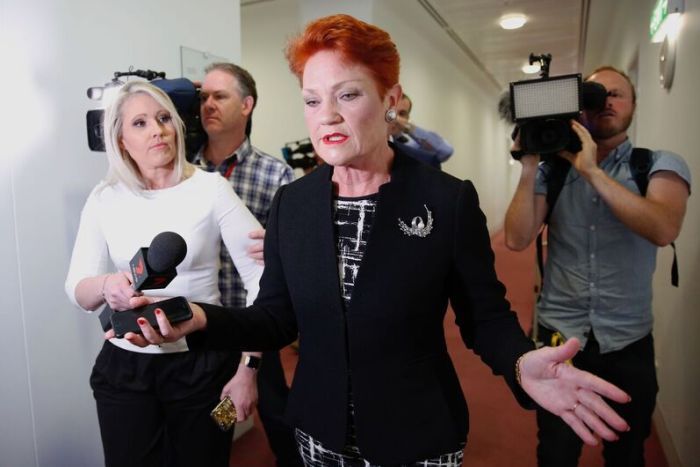Fraser Anning: What just happened in the Senate and why will it cause problems for One Nation?
Updated
That sure was quick.
One Nation's newest senator appears to have quit the party moments after being sworn in.
That's according to party leader Pauline Hanson, anyway. Senator Anning has told the ABC he was booted from the party.
Political divorces are not uncommon. But it is unusual for it to happen so quickly.
OK wait. What just happened?
Let's go back to this morning.
First, Fraser Anning was officially sworn in as One Nation's newest senator.
He was the replacement for Malcolm Roberts, who the High Court ruled was ruled ineligible to sit in the Senate because he was found to be a dual citizen.
About an hour later, Senator Hanson released a statement claiming Senator Anning had "abandoned the party" to stand as an independent "until something else comes along".
According to her statement, Senator Anning walked out of a partyroom meeting this morning when discussing his political future.
A couple of hours after that, Senator Anning said Senator Hanson expelled him from the party.
Is a senator allowed to quit a party?
Yes. In part this is because the vacancy arose because Mr Roberts was disqualified.
That led to a recount of votes from the 2016 election, when Senator Anning was next in line on the One Nation ticket.
If Mr Roberts had resigned from the Senate, a replacement would have been nominated from the party.
Our election analyst Antony Green says once someone is sworn in as a member, there is nothing to tie them to the party under which they contested the election.
"They to some extent have free will to represent their constituents as they wish," he said.
"It's entirely a matter for his conscience and he must judge that."
Would he have been elected without Senator Hanson?
 Photo:
Senator Hanson says she tried to discuss Senator Anning's political future on numerous occasions in recent weeks. (ABC News: Jed Cooper)
Photo:
Senator Hanson says she tried to discuss Senator Anning's political future on numerous occasions in recent weeks. (ABC News: Jed Cooper)
No, not according to Green.
"The only reason Senator Anning is in Parliament is because Pauline Hanson is popular — the same reason that Malcolm Roberts was there," he said.
"Whatever the benefits, personal good things about Fraser Anning and Malcolm Roberts, they are there because they were number two and three on Pauline Hanson's ticket.
"It's her personal appeal that is responsible for both of them."
So where does this leave One Nation?
It's going to cause them some problems, especially for their Queensland election campaign.
"It exposes the tendency for One Nation to lose members once elected," Green said.
"This is the second member. Rod Culleton resigned before being disqualified. Malcolm Roberts didn't resign but was disqualified. Now Fraser Anning has resigned.
"They're trying to fight an election at the moment."
And what about the rest of Parliament?
Well, there's a lesson to be learned here.
"The major lesson from this to political parties is take care who is on your ticket," Green said.
"Make sure your candidates are qualified. If anything comes out of this Parliament, it is that no-one running with a chance of election should allow themselves to be in a position where they can be struck out.
"It's only because senators have been struck out that these other people have been elected on recounts.
"Parties must pay attention to who is further down the ticket, or you will get someone elected who is maybe not as associated with the party as you can."
Has this happened before?
Yup. A lot.
In February this year Cory Bernardi left the Liberal Party to form the Australian Conservatives.
Lucy Gichuhi was elected to the Senate to replace Family First's Bob Day when he was disqualified earlier this year.
But once Family First and the Australian Conservatives merged in April, she decided she would sit as an independent.
In 2013, Senator Jacqui Lambie was elected as part of the Palmer United Party, but she resigned from the party in 2014, then started her own party, the Jacqui Lambie Network, in 2015.
It happens in the House of Representatives too.
In 2001 Bob Katter reigned from the National Party and has retained his seat at every election since.
In fact, according to a parliamentary library research paper from 2003, there were more than 100 MPs and senators who had quit their parties but remained in parliament "and 13 of these [had] done so more than once".
So, Senator Anning's leaving his party might have been dramatic, but it certainly wasn't unique.
Topics: government-and-politics, federal-government, australia
First posted








